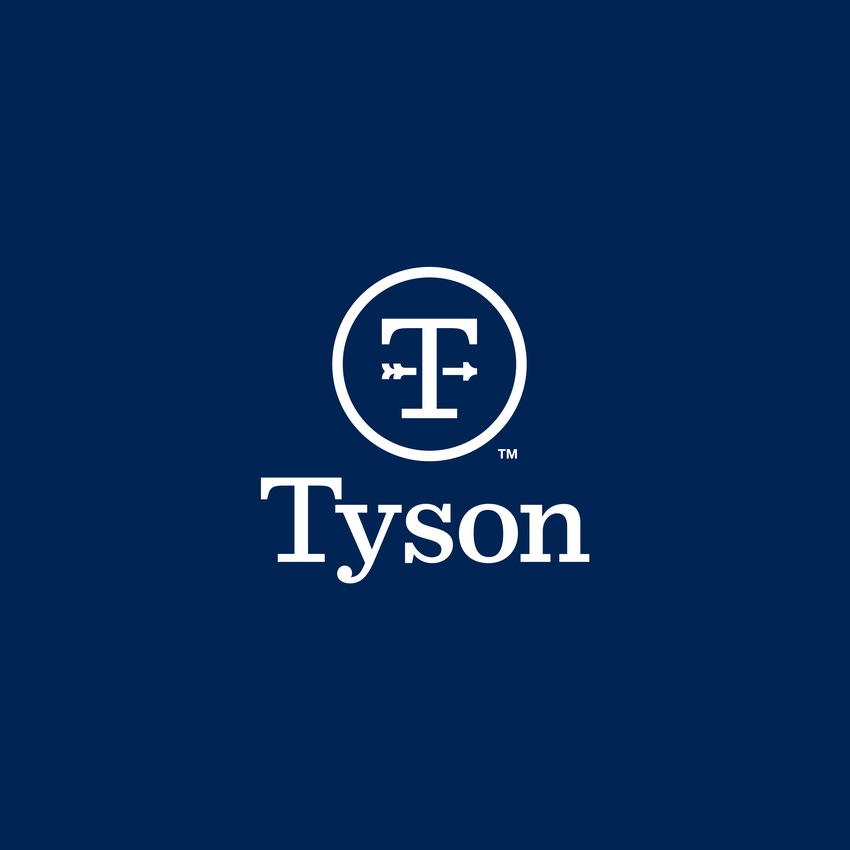Tyson Foods sets 2m-acre land stewardship target
Tyson's sustainable grain commitment is largest ever made by U.S. protein company.
April 4, 2018

Tyson Foods Inc. has committed to support improved environmental practices on 2 million acres of corn by the end of 2020. It is the largest-ever land stewardship commitment by a U.S. protein company and supports Tyson's recently announced goal of reducing greenhouse gas (GHG) emissions 30% by 2030.
The 2 million-acre commitment, which was announced this week as part of the release of Tyson's newest sustainability report, aims to encourage grain farmers to adopt more efficient fertilizer practices and take additional measures to reduce water runoff and soil loss.
“Each day, our team members are defining what it means to achieve our aspiration of sustainably feeding the world. This is a big step that is part of our ongoing and deepening commitment to environmental stewardship,” said Justin Whitmore, Tyson executive vice president corporate strategy and chief sustainability officer. “We’ve made significant progress toward previously announced goals related to workplace safety and fully expect similar momentum with today’s land stewardship target.”
Tyson does not own grain farms but buys corn and soybeans to feed its poultry. It also buys cattle and hogs from farmers and ranchers who use grain to feed their animals. The initiative is expected to help reduce GHG emissions generated by the company’s supply chain.
“The world needs a more sustainable food system, and we believe it’s up to big companies like ours to set the pace with bold goals that help protect the planet while also enabling us to feed a growing world,” Tyson president and chief executive officer Tom Hayes said. “We look forward to collaborating with grain farmers, environmental groups and others as we implement this new initiative.”
To reach the target, Tyson expects to work with at least one third-party organization on a program to encourage corn farmers to adopt practices that reduce fertilizer use and soil loss. Company officials also plan to collaborate with various environmental groups, such as the Nature Conservancy, as well as academic experts.
“The Nature Conservancy would like to congratulate Tyson Foods on its ambitious targets to reduce greenhouse gas emissions in its own operations, support improved environmental practices on 2 million acres of cropland and reduce the amount of water used to produce each pound of food,” said Scott Simon, Arkansas director of the Nature Conservancy. “We look forward to working with the company to implement these influential goals in some of the most critical supply chains and geographies for our conservation mission.”
The 2 million-acre target represents enough land to grow corn to feed all of Tyson's annual broiler chicken production as well as a some of the pigs and cattle the company buys from independent farmers and ranchers for its pork and beef operations.
Tyson is buying an increasing percentage of the grain it needs through its Local Grain Services program, which sources grain closer to where the birds are raised, thereby reducing the energy use associated with transportation.
Sustainability Report
The company today also released its fiscal 2017 "Sustainability Report." Including the environment, it focuses on the following areas:
Community - Tyson donated more than $16 million in cash and in-kind donations in fiscal 2017 and provided almost 40 million servings of food for hunger and disaster relief.
Food - 100% of Tyson's K-12 commodity chicken products contain no artificial ingredients and have the U.S. Department of Agriculture-verified claim of chicken raised with "no antibiotics ever" (NAE) for the 2018-19 school year.
Workplace - Tyson announced a goal to reduce workplace injuries and illnesses 15% year over year in fiscal 2017. In fact, the company reduced its total recordable incident rate 22% in fiscal 2017 compared to its fiscal 2016 performance.
Animal well-being - Tyson continues to provide increased transparency by releasing more details about the Tyson FarmCheck program, which involves third-party, on-farm animal well-being audits. The company has also implemented the industry’s largest third-party remote video auditing system to monitor live animal handling in its poultry plants.
You May Also Like



